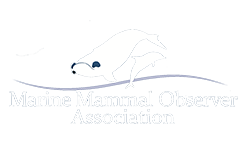The Marine Mammal Observer Association (MMOA) emphasises that a Passive Acoustic Monitoring (PAM) training certificate should not be the only requirement to qualify a person as a PAM Operator. A PAM Operator requires all of the following skills to be able to complete their job professionally and competently:
- A good attitude to conducting monitoring periods of concentrated effort, often for long days and several consecutive weeks – evidence of work experience where this has been proven such as previous surveys at sea or long periods in the field conducting surveys or monitoring work. Attitude/enthusiasm may also be determined via feedback from previous employers or colleagues Ability and experience to identify a range of marine mammal acoustic signals – previous experience of PAM for marine mammals at sea. This experience should be of an appropriate length of time to have gained the skills to be competent at identifying marine mammal acoustic signals and interpreting acoustic software – the MMOA recommends this to be at least 20 weeks during which time a range of marine mammal species should have been encountered.
- Ability to assemble, deploy and configure PAM equipment to optimise signal-to noise ratio – previous experience of PAM for marine mammals at sea. Attendance of appropriate training courses with instruction on assembly and deployment of specific PAM equipment/software.
- Ability to interpret acoustic software for detection and range estimation (where possible) – Previous experience as described above. Attendance on a course to be instructed on PAMGUARD or other suitable software.
- An understanding of the mitigation requirements of the area or project – through appropriate training from a regulator approved training course or from client/employer created training course (where regulator approved courses are not available) and from the provision of a detailed Mitigation Plan (MP) and project EIA for every project.
- Ability to make decisions quickly and to convey the necessary mitigation information to the crew concisely, politely, objectively, and firmly – personnel working as a PAM operator should be independent and should have the character and confidence to make correct mitigating decisions under pressure. Such characteristics might be gauged via feedback from previous employers or colleagues.
- Experience of recording data in a scientific and accurate manner – through a formal academic qualification or through work experience where this was achieved (in the latter case references should be sought).
- Experience of assimilating data, basic acoustic data analysis (i.e., familiarity with producing and interpreting spectrograms) and writing reports – through a formal academic qualification or through work experience where this was achieved (in the latter case references should be sought).
- Ability to work in a team and communicate well – such characteristics might be gauged via feedback from previous employers or colleagues.
- Aspire to improve their skills as a PAM Operator and to further their knowledge – belong to a professional body such as the MMOA or other appropriate professional body where information and code of practice is promoted. Attend training courses and refreshers to improve knowledge and skill through continuing professional development programmes.
A client hiring PAM Operators through a MMO, and PAM provider company (personnel agency) should request this standard of PAM qualification in order to promote a professional standard in their environmental objectives.
Benefits of hiring professional PAM Operators with all of the above skills
The MMOA emphasises that the use of PAM Operators who meet the above professional standards is likely to confer a number of benefits for the clients of mitigation surveys, both in terms of proving compliance with mitigation requirements and maintaining a positive environment on-board the platform. These potential benefits include:
- Client confidence in meeting environmental requirements.
- A professional working attitude by the PAM Operator on board the platform, ensuring courteous interactions with crew, appropriate chains of command are followed, and good cooperation is achieved in the event that mitigation measures are required.
- Accurate identification of SoC acoustic signals which ensures that species-specific mitigation measures are implemented correctly (for detections that can be positivelyidentified to species level using acoustic methods) and potentially avoids erroneous mitigation measures that may be costly to the survey.
- Ability (based on previous experience and correct calibration of acoustic equipment) to make good distance estimates to acoustic signals (where equipment permits), which may avoid unnecessary disruption to the survey.
- Collection of standardised, high-quality acoustic data that serves to prove compliance with mitigation requirements and may additionally contribute to robust scientific analysis.
- Knowledge and experience to answer questions that arise during the survey, and to guide the crew through the required mitigation measures clearly and concisely to avoid error and confusion.

